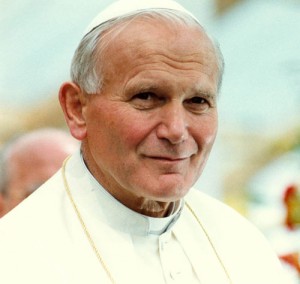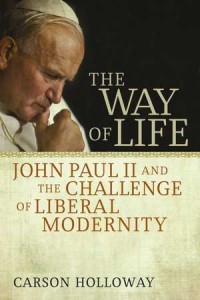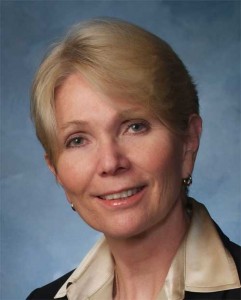 “Non-Negotiable: Essential Principles of a Just Society and Humane Culture” by Sheila Liaugminas is a fantastic book which clearly articulates the essence of Catholic Social Doctrine, especially those teachings which touch the lives of Catholic Americans. She addresses important challenges many face in the arena of politics and cultural relativism and offers solid guidance in the struggle to restore respect for human dignity.   Excellent!
“Non-Negotiable: Essential Principles of a Just Society and Humane Culture” by Sheila Liaugminas is a fantastic book which clearly articulates the essence of Catholic Social Doctrine, especially those teachings which touch the lives of Catholic Americans. She addresses important challenges many face in the arena of politics and cultural relativism and offers solid guidance in the struggle to restore respect for human dignity.   Excellent!
[powerpress]
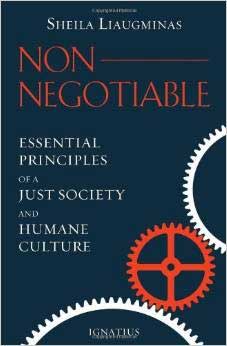 You can find the book here
You can find the book here
“I truly admire Sheila Liaugminas. She is an outstanding journalist. We have dialogued extensively on her radio program about the rights of conscience and the protection of what we call our ‘first principles.’ Sheila has laid out in great breadth and depth the need for a revived understanding of the essentials of human dignity and societal organization.”
– Jeff Fortenberry, Member of Congress
“Both Pope Benedict XVI and Pope Francis have spoken of the ‘dictatorship of relativism’ in our world today and its negative impacts not just on our faith, but to the common good of society. Shelia Liaugminas draws upon the universal principle of natural human rights and dignity to address several contemporary moral issues which have suffered as a result of a relativistic mindset. Her book is a valuable resource in the struggle to restore a true, just and virtuous society.”
– Most Reverend Thomas Paprocki, Bishop of Springfield, Illinois
Tags: catholic, catholic podcast, catholic prayer, cathollc spirituality
This entry was posted on Tuesday, June 24th, 2014 at 4:31 pm
You can follow any responses to this entry through the RSS 2.0 feed.
WOL6 – Episode 6-  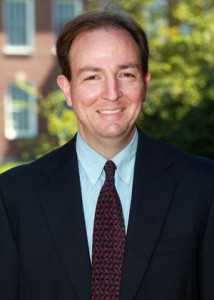 “Democracy in America” by Alexis de Tocqueville is the focus of this episode.  What is “democracy” and why did it work it in the American experience.  There is much that is good and sound in the founding of “modern western democracy”, but what has happened in the view of “Evangelium Vitae” that has possible knocked it off track.
“Democracy in America” by Alexis de Tocqueville is the focus of this episode.  What is “democracy” and why did it work it in the American experience.  There is much that is good and sound in the founding of “modern western democracy”, but what has happened in the view of “Evangelium Vitae” that has possible knocked it off track.
The Way of Life, Carson Holloway examines the fundamental philosophers of modernity-from Hobbes to Toqueville-to suggest that St. John Paul II’s critique of modernity is intended not to reject, but to improve. Thus, claims Holloway, it is appropriate for liberal modernity to attend to the Pope’s thought, receiving it not as the attack of an enemy but as the criticism of a candid friend.
  For other episodes in the series visit Dr. Holloway’s Discerning Hearts page
This series is based on Dr. Holloway’s book “The Way of Life”
Tags: catholic, catholic podcast, catholic prayer, cathollc spirituality, st. john paul ii
This entry was posted on Tuesday, June 24th, 2014 at 12:58 pm
You can follow any responses to this entry through the RSS 2.0 feed.
WOL4 – Episode 4 –   The Scottish Enlightenment…what was it and why was it such an important movement to understand.  The influence of David Hume - Scottish philosopher, historian, economist, and essayist.  The flaw in Hume’s philosophy –  that self-interest is  stronger than sympathy, and if morality, according to Hume’s thinking,  is derived from the passions, then ultimately self-interest is a greater worth and motivator than sympathy.  This conflicts with the Christian understanding of the “Golden Rule” and fuels the Culture of Death…those in need become very vulnerable in the culture.
The Scottish Enlightenment…what was it and why was it such an important movement to understand.  The influence of David Hume - Scottish philosopher, historian, economist, and essayist.  The flaw in Hume’s philosophy –  that self-interest is  stronger than sympathy, and if morality, according to Hume’s thinking,  is derived from the passions, then ultimately self-interest is a greater worth and motivator than sympathy.  This conflicts with the Christian understanding of the “Golden Rule” and fuels the Culture of Death…those in need become very vulnerable in the culture.
[powerpress]
The Way of Life, Carson Holloway examines the fundamental philosophers of modernity-from Hobbes to Toqueville-to suggest that John Paul II’s critique of modernity is intended not to reject, but to improve. Thus, claims Holloway, it is appropriate for liberal modernity to attend to the Pope’s thought, receiving it not as the attack of an enemy but as the criticism of a candid friend.
 Â
For other episodes in the series visit Dr. Holloway’s Discerning Hearts page
This series is based on Dr. Holloway’s book “The Way of Life”
Tags: Carson Holloway, David Hume, Scottish Enlightenment
This entry was posted on Monday, April 21st, 2014 at 6:00 am
You can follow any responses to this entry through the RSS 2.0 feed.
WOL3 – Episode 3 -The influence of Thomas Hobbes and his role as the father of modern-day liberalism.   Absolute monarchy and the tyranny of “unlimited” government.  The difference between Divine-right monarchy and Absolute monarchy, and the legitimacy thought behind “dictatorship”.  How this affects ruling systems in history, and it’s influence on the “Culture of Death”.  Who was John Locke?  The Law of Nature and it’s obligations according to Locke’s thought.  The fundamental rule to preserve oneself.  Bl. John Paul’s response to that thought…to respect the moral law and give of oneself.
Absolute monarchy and the tyranny of “unlimited” government.  The difference between Divine-right monarchy and Absolute monarchy, and the legitimacy thought behind “dictatorship”.  How this affects ruling systems in history, and it’s influence on the “Culture of Death”.  Who was John Locke?  The Law of Nature and it’s obligations according to Locke’s thought.  The fundamental rule to preserve oneself.  Bl. John Paul’s response to that thought…to respect the moral law and give of oneself.
[powerpress]
The Way of Life, Carson Holloway examines the fundamental philosophers of modernity-from Hobbes to Toqueville-to suggest that John Paul II’s critique of modernity is intended not to reject, but to improve. Thus, claims Holloway, it is appropriate for liberal modernity to attend to the Pope’s thought, receiving it not as the attack of an enemy but as the criticism of a candid friend.
 Â
For other episodes in the series visit Dr. Holloway’s Discerning Hearts page
This series is based on Dr. Holloway’s book “The Way of Life”
Tags: catholic, catholic podcast, catholic prayer
This entry was posted on Thursday, April 10th, 2014 at 1:43 pm
You can follow any responses to this entry through the RSS 2.0 feed.
WOL2 – Episode 2 – What is “Evangelium Vitae (The Gospel of Life)”?  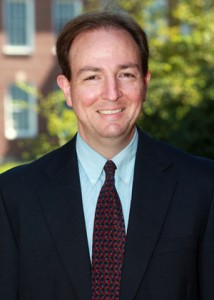 What does this have to do with Liberal Modernity?  What is wrong with public culture we now have?  What is the Culture of Death?  Are there defects that go at the deepest foundational levels of our culture that have led to this behavior?  Human dignity has to be recognized on all levels.  Who was Thomas Hobbes, English philosopher and proponent of absolute government?  His life and times? And what are the damaging effects  of his thought on the value of the human person?  What would be Bl. John Paul’s response?
What does this have to do with Liberal Modernity?  What is wrong with public culture we now have?  What is the Culture of Death?  Are there defects that go at the deepest foundational levels of our culture that have led to this behavior?  Human dignity has to be recognized on all levels.  Who was Thomas Hobbes, English philosopher and proponent of absolute government?  His life and times? And what are the damaging effects  of his thought on the value of the human person?  What would be Bl. John Paul’s response?
[powerpress]
The Way of Life, Carson Holloway examines the fundamental philosophers of modernity-from Hobbes to Toqueville-to suggest that John Paul II’s critique of modernity is intended not to reject, but to improve. Thus, claims Holloway, it is appropriate for liberal modernity to attend to the Pope’s thought, receiving it not as the attack of an enemy but as the criticism of a candid friend.
For other episodes in the series visit Dr. Holloway’s Discerning Hearts page
 Â
This series is based on Dr. Holloway’s book “The Way of Life”
Tags: catholic, catholic podcast, catholic prayer
This entry was posted on Friday, March 21st, 2014 at 12:30 am
You can follow any responses to this entry through the RSS 2.0 feed.
From Omar F. A. Gutierrez (found on his blog)
I cannot tell you how many times I have heard this complaint from well-meaning Catholics: “We have a 40 Days for Life and a March for Life and a Novena for Life, but why don’t the bishops get behind a 40 Days for Poverty or a March to End Poverty campaign? Why can’t the bishops give equal time to all the other life issues?†Here’s what I usually say:
1) I think it is important to agree that poverty is a life issue. Likewise, it is important to agree that addressing poverty and its many causes is part of our responsibility as Catholics. So saying things like, “Helping the poor is the business of local churches and charities and is not the work of the government†is nonsense and actually counters Catholic Social Teaching. The government does and must have a role if for no other reason than to reinforce the notion that alleviating the affects of poverty is a communal responsibility. The level of governmental involvement is debatable, but that it should be involved really isn’t.
2) But then it needs to be pointed out to the well-meaning Catholic that there is no single legislative embodiment of the perpetuation of poverty. There is no one law that exists in our land which states, “poverty is a good thing,†or “we want poor people,†or “being poor is a Constitutional necessity.†There is, however, a singular decision that has enshrined abortion on demand, a singular legal decision which has created a structure around abortion that is one of the most permissive in the entire world, a singular argument that is so legally unsound that even supporters of abortion think it is bad law. That law is Roe v. Wade, and it needs to be overturned.
Saying that poverty needs to be overturned might be a nice sound bite, but it is meaningless. There is no single legal strategy that will ever eradicate poverty, indeed, Our Lord tells us that poverty will always exist. I know many who cringe at the mention of this fact, but it is a fact, and it means only what it means. We will always have the poor with us.
3)  To this many respond, “Well, we’ll always have abortion too.†Yes, that’s right, which is why the strategic goal of the U.S. Bishops is not to thwart abortions for all time. Thanks to sin, abortion will always be with us. Therefore, our goal is not to undue sin but rather to overturn legalized abortion. The goal is always to finally put an end to the legal structure that allows one class of persons to snuff out the life of another class of persons. Put otherwise, our goal is to make abortion illegal not impossible. There is no way to make it impossible, and making poverty illegal is nonsensical.
4)  There is another crucial difference. We have all this public pro-life work because there are still so many Americans and even many Catholics who are convinced that abortion is okay. Though there are some who callously dismiss the plight of the poor as a punishment for their own laziness, it is nevertheless the case that expressing this opinion is roundly condemned by our culture. Everyone knows, even if they dare to think it, that blaming the poor for their poverty is asinine. It’s considered “edgy†to say so when it is said. And no one runs on a platform that says, “let the poor stay poor.†Democrats accuse Republicans of just that, but they have to infer that’s the case because no one would dare say it publicly. That’s the difference.
When was the last time you saw reps for “Catholics for Poverty†on TV?
We do have Catholics, on the other hand, who think that abortion is alright. There are even Catholic University professors who teach that abortion can be a moral act. Heck, we have an entire political party dedicated not just to keeping abortion legal but to making sure it’s free for whoever wants one, along with Catholics who vote for candidates who publicly say “abortion is a Constitutional right†and “I don’t want my daughters punished with a child.â€
5) Also, by defending the rights of the unborn, the bishops actually are advocating for the poor. The effort to help the poor will always fail so long as Americans continue to think that the life of the unborn child is expendable. The popes have said repeatedly, in all sorts of different ways, that a legal structure and a culture that rejects the life of the unborn innocent cannot hope to achieve a social justice that will honestly address the needs of the poor. The rights to labor, a just wage, education, health care, family and the rest are all “false and illusory,†to quote John Paul the Great, if the right to life is not defended to the maximum.
6) The truth is that the bishops’ do advocate for the poor, here and abroad. On state levels and at the national, they do advocate for those policy decisions that help the poor. Now, I don’t always agree with them on what helps the poor and what doesn’t, but they are far from silent about it. We could probably be reminded more often about our own responsibilities. No doubt there are a few prelates here or there who could take a cue from Pope Francis and give up the “trappings†of the ecclesial machine. Certainly, Catholics with means (even myself – as meager as my means are) could be more generous with our donations to fund poverty relief, especially those which address the root causes of poverty and build up family life.
But while all that may be true, abortion is singularly odious because of the laws that protect it and because of a culture that defends it. God bless all those who work for life . We need more of them, and we need more Catholics who love the poor to get behind the pro-life movement and to stop supporting candidates who perpetuate this genocide.
Omar F. A. Guiterrez, M.A. , Special Assistant  to Archbishop George Lucas of the Archdiocese of Omaha.  He’s also the author of “The Urging of Christ’s Love:  The Saints and The Social Teaching of the Catholic”
Tags: catholics
This entry was posted on Tuesday, February 18th, 2014 at 6:08 pm
You can follow any responses to this entry through the RSS 2.0 feed.
“Conscience and It’s Enemies: Confronting the Dogmas of Liberal Secularism” is one of the best articulations of today’s battle over religious liberty and 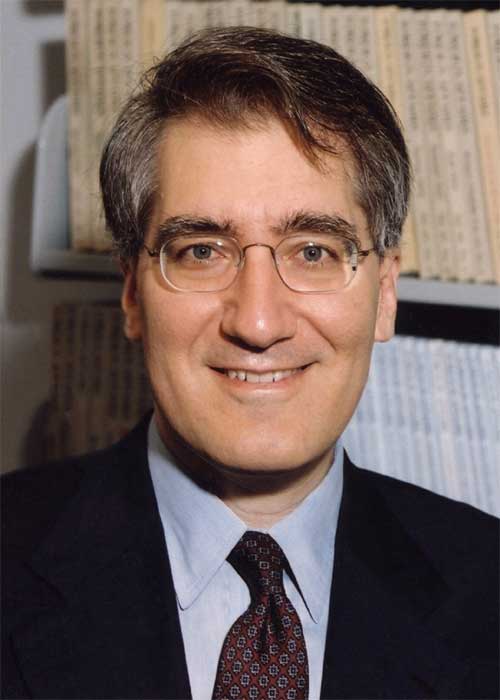 traditional morality.  Dr. Robert George’s clarity and insight is indispensable for  understanding where we have been, where we are going, and what paths we could be traveling down if we fail to action on the leading morality challenges facing as individuals and citizens.  Pass by this book and it’s message at your own risk.
traditional morality.  Dr. Robert George’s clarity and insight is indispensable for  understanding where we have been, where we are going, and what paths we could be traveling down if we fail to action on the leading morality challenges facing as individuals and citizens.  Pass by this book and it’s message at your own risk.
As the book description states: “In defending what James Madison called the “sacred rights of conscienceâ€â€”rights for which government shows frightening contempt—George grapples with today’s most controversial issues: abortion and infanticide, same-sex marriage, genetic manipulation, euthanasia and assisted suicide, religion in politics, judicial activism, and more. His brilliantly argued essays rely not on theological claims or religious authority but on established scientific facts and a philosophical tradition that extends back to Plato and Aristotle.”
[powerpress]
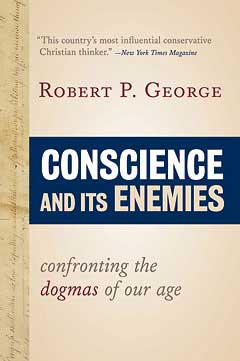 You can find it here
You can find it here
“One of the most incisive legal and moral thinkers working today.†—First Things
“One of contemporary conservatism’s intellectual pinups.†—George F. Will
“Professor George has helped strengthen our nation’s system of ordered liberty by exploring enduring questions of American constitutional law and Western political theory.†—President George W. Bush, in awarding the Presidential Citizens Medal
Tags: catholic, catholic podcast, catholic prayer
This entry was posted on Monday, June 24th, 2013 at 7:38 am
You can follow any responses to this entry through the RSS 2.0 feed.
[powerpress]
Tags: catholic, catholic podcast, catholic prayer, cathollc spirituality, Contraception, homosexuality, janet smith
This entry was posted on Saturday, July 14th, 2012 at 3:39 pm
You can follow any responses to this entry through the RSS 2.0 feed.
[powerpress]
Tags: catholic, catholic podcast, catholic prayer, cathollc spirituality, Mary Schindler, Teri Schiavo
This entry was posted on Saturday, July 14th, 2012 at 3:22 pm
You can follow any responses to this entry through the RSS 2.0 feed.
[powerpress]
Tags: catholic, catholic podcast, catholic prayer, cathollc spirituality
This entry was posted on Saturday, July 14th, 2012 at 3:21 pm
You can follow any responses to this entry through the RSS 2.0 feed.
[powerpress]
Tags: catholic, catholic podcast, catholic prayer, cathollc spirituality
This entry was posted on Saturday, July 14th, 2012 at 3:19 pm
You can follow any responses to this entry through the RSS 2.0 feed.
[powerpress]
Tags: catholic, catholic podcast, catholic prayer, cathollc spirituality, Rachels Vineyard, Theresa Burke
This entry was posted on Saturday, July 14th, 2012 at 3:14 pm
You can follow any responses to this entry through the RSS 2.0 feed.
[powerpress]
Tags: catholic, catholic podcast, catholic prayer, cathollc spirituality
This entry was posted on Saturday, July 14th, 2012 at 3:11 pm
You can follow any responses to this entry through the RSS 2.0 feed.
[powerpress]
Tags: catholic, catholic podcast, catholic prayer, cathollc spirituality
This entry was posted on Saturday, July 14th, 2012 at 3:09 pm
You can follow any responses to this entry through the RSS 2.0 feed.
[powerpress]
Tags: catholic, catholic podcast, catholic prayer, cathollc spirituality
This entry was posted on Saturday, July 14th, 2012 at 3:05 pm
You can follow any responses to this entry through the RSS 2.0 feed.

